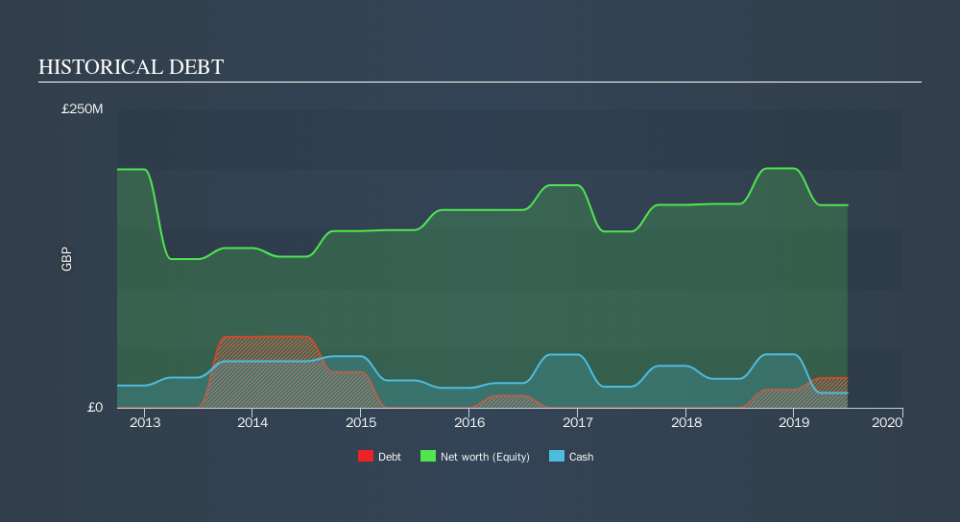Is Moneysupermarket.com Group (LON:MONY) A Risky Investment?

Warren Buffett famously said, 'Volatility is far from synonymous with risk.' So it might be obvious that you need to consider debt, when you think about how risky any given stock is, because too much debt can sink a company. As with many other companies Moneysupermarket.com Group PLC (LON:MONY) makes use of debt. But is this debt a concern to shareholders?
When Is Debt Dangerous?
Debt assists a business until the business has trouble paying it off, either with new capital or with free cash flow. Ultimately, if the company can't fulfill its legal obligations to repay debt, shareholders could walk away with nothing. However, a more frequent (but still costly) occurrence is where a company must issue shares at bargain-basement prices, permanently diluting shareholders, just to shore up its balance sheet. Of course, the upside of debt is that it often represents cheap capital, especially when it replaces dilution in a company with the ability to reinvest at high rates of return. The first step when considering a company's debt levels is to consider its cash and debt together.
See our latest analysis for Moneysupermarket.com Group
What Is Moneysupermarket.com Group's Net Debt?
The image below, which you can click on for greater detail, shows that at June 2019 Moneysupermarket.com Group had debt of UK£25.0m, up from none in one year. On the flip side, it has UK£12.4m in cash leading to net debt of about UK£12.6m.
How Healthy Is Moneysupermarket.com Group's Balance Sheet?
Zooming in on the latest balance sheet data, we can see that Moneysupermarket.com Group had liabilities of UK£93.8m due within 12 months and liabilities of UK£43.7m due beyond that. Offsetting these obligations, it had cash of UK£12.4m as well as receivables valued at UK£53.8m due within 12 months. So it has liabilities totalling UK£71.3m more than its cash and near-term receivables, combined.
Given Moneysupermarket.com Group has a market capitalization of UK£1.99b, it's hard to believe these liabilities pose much threat. However, we do think it is worth keeping an eye on its balance sheet strength, as it may change over time. Carrying virtually no net debt, Moneysupermarket.com Group has a very light debt load indeed.
We measure a company's debt load relative to its earnings power by looking at its net debt divided by its earnings before interest, tax, depreciation, and amortization (EBITDA) and by calculating how easily its earnings before interest and tax (EBIT) cover its interest expense (interest cover). The advantage of this approach is that we take into account both the absolute quantum of debt (with net debt to EBITDA) and the actual interest expenses associated with that debt (with its interest cover ratio).
Moneysupermarket.com Group has a low net debt to EBITDA ratio of only 0.10. And its EBIT covers its interest expense a whopping 80.7 times over. So you could argue it is no more threatened by its debt than an elephant is by a mouse. The good news is that Moneysupermarket.com Group has increased its EBIT by 6.4% over twelve months, which should ease any concerns about debt repayment. There's no doubt that we learn most about debt from the balance sheet. But it is future earnings, more than anything, that will determine Moneysupermarket.com Group's ability to maintain a healthy balance sheet going forward. So if you're focused on the future you can check out this free report showing analyst profit forecasts.
But our final consideration is also important, because a company cannot pay debt with paper profits; it needs cold hard cash. So we clearly need to look at whether that EBIT is leading to corresponding free cash flow. Over the last three years, Moneysupermarket.com Group recorded free cash flow worth a fulsome 81% of its EBIT, which is stronger than we'd usually expect. That puts it in a very strong position to pay down debt.
Our View
Moneysupermarket.com Group's interest cover suggests it can handle its debt as easily as Cristiano Ronaldo could score a goal against an under 14's goalkeeper. And the good news does not stop there, as its conversion of EBIT to free cash flow also supports that impression! Looking at the bigger picture, we think Moneysupermarket.com Group's use of debt seems quite reasonable and we're not concerned about it. While debt does bring risk, when used wisely it can also bring a higher return on equity. We'd be very excited to see if Moneysupermarket.com Group insiders have been snapping up shares. If you are too, then click on this link right now to take a (free) peek at our list of reported insider transactions.
If, after all that, you're more interested in a fast growing company with a rock-solid balance sheet, then check out our list of net cash growth stocks without delay.
We aim to bring you long-term focused research analysis driven by fundamental data. Note that our analysis may not factor in the latest price-sensitive company announcements or qualitative material.
If you spot an error that warrants correction, please contact the editor at editorial-team@simplywallst.com. This article by Simply Wall St is general in nature. It does not constitute a recommendation to buy or sell any stock, and does not take account of your objectives, or your financial situation. Simply Wall St has no position in the stocks mentioned. Thank you for reading.

 Yahoo Finance
Yahoo Finance 
